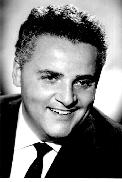Albert da Costa was born in New York in 1927 and studied at the Juilliard School. He made his debut as a baritone in 1949
with the Charles Wagner Opera Company but after a couple of
years
switched to tenor.
In 1952, he sang at the Baltimore Opera.
In 1955, he was engaged by the Metropolitan Opera and made his debut there as the Sailor in Tristan und Isolde.
In 1957, he sang Walther von Stolzing in Die Meistersinger with a cast including Paul Schöffler and Lisa Della
Casa. In 1958, da Costa sang Radamès at Covent Garden.
From then on at the Met, he sang roles like Siegmund, Erik, Radamès and Manrico until 1962 when he moved to Europe and joined the ensemble at
Zürich Opera (1962–65 and again fron from 1966), where he sang Manrico, Radamès, Ägisth,
Hüon, Canio, Cavaradossi, Herodes, Parsifal, Andrea Chénier,
Elemer, Sänger, Tristan, Florestan, Walther among others. He took part in the Zürich revival
of Ein Engel kommt nach Babylon in 1963.
He also sang Otello with great success in Germany.
From 1962, he sang at the Staatstheater Hannover, and from 1964 at the Opernhaus Köln.
His life was cut short in 1967 in a car
accident while singing in Norway.
He was only forty.
His repertory also included Alvaro, Rodolfo, José, Tambourmajor and Alfred (Fledermaus).
He recorded for Allegro Royale, Columbia (Beethoven 9th Symphony) and Dimitri for a Met Boris Godunov.
His was a strong
dramatic voice, baritonal in the middle register but with imposing tenoral brilliance up high. The high Cs are perfectly in order and
in the Puritani aria (Credeasi, misera) he sails even higher, seemingly effortlessly. To sing Bellini is not perhaps the most natural
thing for a Tristan.
His stamina is
indisputable and the quality of the voice is fine.
He was also one of the three tenors singing Tristan with Birgit Nilsson on 28 December 1959 at the MET. The others were Vinay and
Liebl,
all three were sick and accepted to sing one act. Da Costa sang the most difficult one for the tenor: the third act.
